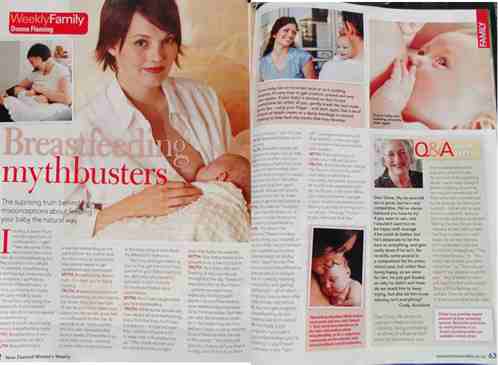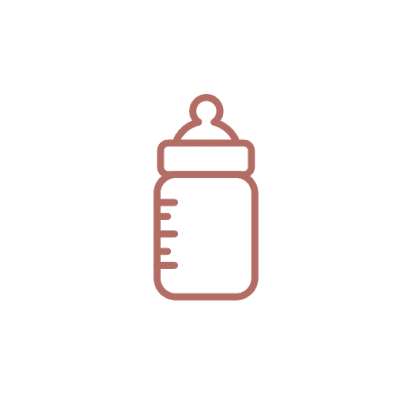We are thrilled to provide some realistic breastfeeding information in mainstream media. Here is a copy of the Breastfeeding Myths article that we featured in New Zealand Woman’s Weekly 1 August 2011.

Here is the article:
Breastfeeding Mythbusters
The surprising truth behind many misconceptions about feeding your baby the natural way.
It’s easy, it doesn’t hurt and it’s a great form of contraception – right? These are some of the ideas many new mums have about breastfeeding, but they could be in for a shock. For example, breastfeeding doesn’t always come naturally to everyone, says Frances McInnes of Breastmates, an online community for mums with baby-feeding issues.
“It can be a very trying time – especially if you have the wrong idea about some aspects of breastfeeding.”
Here’s the truth about some common breastfeeding myths.
Myth: Breastfeeding is very easy, and anyone can do it.
Truth: Breastfeeding is a learned relationship on the parts of both the mother and child, and can take several weeks to get established and comfortable.
Myth: Breastfeeding doesn’t hurt – if it hurts, you’re doing it wrong.
Truth: Breastfeeding can hurt in the beginning, as your nipples are tender from this new type of use. As your baby draws your nipple into his mouth, it can feel uncomfortable for the first 30 seconds or so. Some women find that this pain dissipates after several weeks of breastfeeding, while other women continue to have a few tense moments at the beginning of each feed. It’s different for everyone. “But if you feel eye-watering, toe-curling, get-me-out-of-here pain when your baby is latching on, definitely call a lactation specialist or your midwife to check your baby’s latch,” says Frances.
Myth: You’ll lose weight while you’re breastfeeding.
Truth: While some women do lose weight while breastfeeding, many find that they don’t lose a single kilo – simply because they need to consume a lot to keep their milk production up. Often these women end up losing this extra weight after their baby has weaned.
Myth: Your baby needs to be breastfed on a fixed schedule.
Truth: Your baby will need feeding at varying intervals throughout the day. Newborns feed every two to four hours (sometimes even more, especially during growth spurts), so you’ll be feeding your newborn approximately 12-14 times a day. Each feed can take 30 minutes or more, so in the beginning, you may feel your baby is just as attached to your body as when he was in the womb! “Your baby will give you cues to tell you he’s hungry, and it’s fine if you feed him on demand,” says Frances.
Myth: Breastfed babies don’t get wind.
Truth: Breastfed babies can still get wind, especially as they stop and start often during a feed. Feed your baby from one breast until he is finished, burp him, change his nappy. Then feed him from the other breast and burp him again afterwards. A burp will usually come up within two to three minutes of gentle back-patting.
Myth: You need to “toughen up” your nipples while you’re pregnant, in order to prepare them for breastfeeding.
Truth: “Put down that toothbrush! There’s no value in dry-brushing your nipples , or doing any of the other “recommended” nipple-toughening exercises abundant on dodgy websites,” says Frances.
The keys to successful breastfeeding are making sure your baby is latched on correctly, learning what to look for, and getting your timing right – all of which are things you have to learn after your baby arrives, not before.
Myth: You can’t get pregnant while you’re breastfeeding, so you don’t need to use birth control.
Truth: Your body is still ovulating even if you aren’t having your period when you’re breastfeeding, so you’ll need to use condoms or the “mini pill”, a progesterone-only pill that doesn’t contain estrogen (a hormone which can interfere with lactation).
Myth: If you get angry or upset, your milk will go sour.
Truth: Some foods can change the flavour of your milk, which your baby might notice – such as chocolate, tomatoes, spicy food, or cruciferous vegetables like cauliflower or broccoli. While your baby can sense changes in your mood, rest assured a grumpy afternoon won’t somehow “show up” in your breastmilk later that day!
If your baby has an incorrect latch or is not suckling properly, it is very easy to get cracked, grazed, and very sore nipples. If your baby is latched on but it’s not comfortable for either of you, gently break the seal made by his lips using your finger and start again. Use a small amount of nipple cream or a moist wound dressing such as Hydrogel Breast Discs to help heal cracks.








